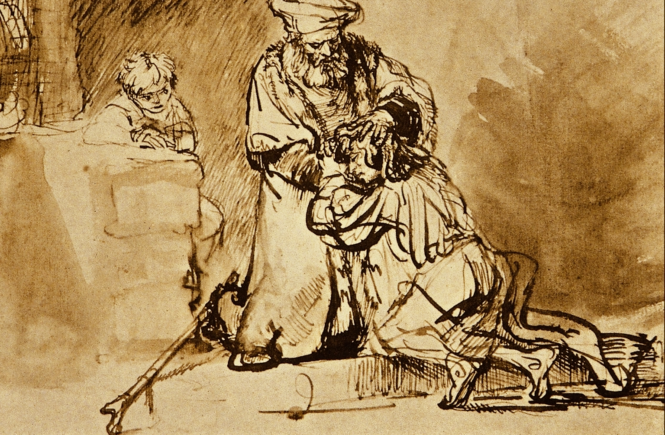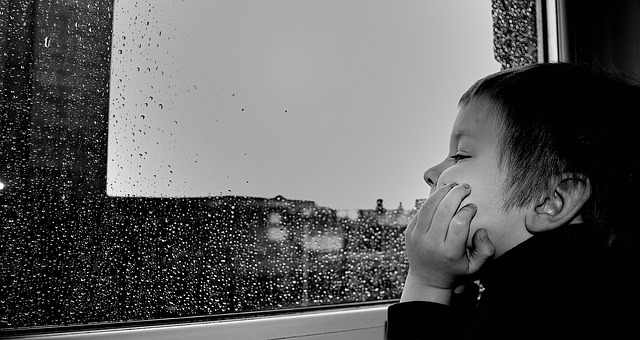Today’s readings cover a rich array of topics. We read about the early disciples of Christ in the Acts of the Apostles and their work to start and to continue the Kingdom of God. We hear about a new Heaven and a new Earth and of a New Jerusalem descending as a bride adorned for her husband. And finally we read about Jesus’s new commandment: to love one another as He has loved.
I have often talked about the dangers of seeing love purely as an emotion, as butterflies in our stomachs and goose bumps. A couple weeks ago, I stepped in at a wedding for a priest who got sick. I asked the couple, probably in their early twenties, about their marriage preparation and if they were ready.
“Are you sure you’re ready for this commitment?” I said, half jokingly.
“Oh, Father, we’re ready for anything because we love each other.”
I noticed an elderly couple in the back who overheard the conversation, look at each other with a gaze and a half smile as though saying They don’t know what they’re getting themselves into!
Anybody who’s been in a marriage for more than five years knows that love has to be something more than an emotion, something more lasting than a feeling. That is what will we be reflecting on today, this commandment of Jesus to love one another as He has loved us.
The homily is going to get a bit dark in a moment, but this is to explore what it truly means to love. If you get anything out of the homily may it be this: love and responsibility always go together. Always.
Love is Harsh and Dreadful…Life is Suffering
It was Dostoyevsky, the great Russian author, who said, that “love in action is a harsh and dreadful thing.” Not only is it not butterflies in our stomachs, but love in action – to love truly – is a harsh and dreadful thing. In order to understand what love is and Jesus’ words about love, we need to explore what life is, at least biblically.
Most religions, even Buddhism, see suffering as an intrinsic part of life; that is particularly true in our Christian faith and we see the mystery of suffering signified by the cross. Not only is life suffering, but it seems to be compounded by malevolence, by people committing evil actions for the sake of provoking suffering! This begs the question: What is the purpose of suffering children who endure terrible, painful illnesses and die? The sad thing is not that we suffer, but that we don’t always find a purpose in our suffering.
Life is not fair.
We don’t choose our parents.
We don’t choose our children or siblings.
We don’t choose our illnesses.
We don’t choose our personality flaws.
So, to recap, life is suffering, and suffering compounded by malevolence, and it is not fair. Padre, this seems a pretty gloomy picture of life. Where does love come in, again? Well, this is the inflection point.
If you confront suffering voluntarily, you’ll find that you are way tougher than you think. You will find a spirit of resilience in you that refuses to be bogged down. If you confront suffering voluntarily, you’ll be in contact with that robust Spirit that is capable of overcoming and alleviating any source of suffering, making it better for others and for yourself; it is the same Spirit that compelled Christ to preach, to teach, and to give his life. The key word is confronting suffering voluntarily.
That’s where response-ability comes in. There’s a great danger of losing our response-ability, losing the ability to respond to whatever life throws at us, turning us into victims of Life.
I Didn’t Choose This
The dangerous mentality of victimhood lies in that the victim holds responsibility for nothing that has happened to him, and creates a prison in his own mind:
I am the victim of my own life.
I’m not responsible for anything.
I didn’t choose this illness.
I didn’t choose these children.
I didn’t choose this or that.
That doesn’t mean that to fall into the victim mentality is not to be a victim. Sometimes we are victims of great evils. We can be the victim of an illness, perhaps a terminal one. We can be the victim of a loss of a loved one, of violence or of an abuse in our past. We can be the victim of many things, but what truly takes away our freedom is to give in to the victim mentality. We lose our ability to respond. I’m convinced that, rather than shielding them from the sufferings of life, this capacity of resilience, this ability to respond is the best teaching we can pass on to our kids. There is something very powerful in learning that whatever the circumstances, we can choose our response.
The death of Saint John Paul II has always been a great testimony for me. This was a man devoted to preaching, to living as a son of God, to leading the Church. Little by little, his body and mind deteriorated, but he never gave in to a victimistic mindset. Those who’ve suffered a psychological or physical illness know that there comes a time when the illness starts to lay claims on more than our physical faculties; restlessness, despair, sadness, abandonment begin to erode our spirit if we give our freedom to this illness. There comes a time when we must say, “Even though I’m the victim of this suffering, I can choose how to respond. I’m still response-able.”
One Small Thing
There were a couple of months when I was home bound. I couldn’t get out of bed after a bad car accident in Mexico, finishing a retreat down in Mexico, before I joined the seminary. In my recovery, I could barely move and couldn’t leave my house. Initially I was up-beat and hopeful, but eventually I began to feel the darkness of victimism take over: I can’t do any exercise. I can’t see my friends. I can’t go to school. Me, me, me. Nobody takes care of me! Then I discovered that the mental suffering was compounding my physical suffering. It was making my suffering more unbearable and making my healing slower. It was making me bitter. I couldn’t even stand myself.
In a moment of prayer, I asked the Lord for His grace of suffering as He would. And I decided to take responsibility for one thing every day. One small thing. The first thing I decided to do was to smile: smile at whoever visited me, smile in thanksgiving at my food—smile, especially when I didn’t feel like smiling. This helped to stop feeling bad about myself and brooding. Next day it was to clean my closet, then call a friend I haven’t connected with, then to read for 15 minutes. Taking responsibility of one small daily thing gave me a bit of freedom and capacity to love a little more. I might not control most of the things in my life, but I can still choose how I respond. Be careful of victimism: it’ll rob you of your freedom to love.
Weakness Can Be a Source of Strength
Enough about me. Let’s look at how Paul and Jesus dealt with suffering and adversity. Paul, as you know, founded several churches. He was always traveling, moving, preaching. There was something pushing him to keep going. One church, the Corinthians, writes to Paul and Paul senses that their suffering is taking the best of them. This is what Paul writes back.
Are they ministers of Christ? (I am talking like an insane person.) I am still more, with far greater labors, far more imprisonments, far worse beatings, and numerous brushes with death. Five times at the hands of the Jews I received forty lashes minus one. Three times I was beaten with rods, once I was stoned, three times I was shipwrecked, I passed a night and a day on the deep; on frequent journeys, in dangers from rivers, dangers from robbers, dangers from my own race, dangers from Gentiles, dangers in the city, dangers in the wilderness, dangers at sea, dangers among false brothers; in toil and hardship, through many sleepless nights, through hunger and thirst, through frequent fastings, through cold and exposure. And apart from these things, there is the daily pressure upon me of my anxiety for all the churches. Who is weak, and I am not weak? Who is led to sin, and I am not indignant? If I must boast, I will boast of the things that show my weakness (Corinthians 11:23-30).
Paul is able to respond to his weakness, and in that he glories. He was beaten; shipwrecked three times; spent the night and the day floating out at sea; stoned. Yet, he didn’t stay imprisoned in his own victimhood. In the midst of all this pain and eventual death, his spirit remained free enough to love. He kept going. Think of Jesus, the true “victim.” We could even say that if there ever existed a victim in the world, someone to whom everything was taken, the only truly innocent man, it was him. Look at what Jesus says, “No one takes my life. But I laid down on my own accord” (Jn 10:18). What does Jesus mean by no one taking his life? He was beaten and crucified! And yet HE gave his life. It is this ability to respond in the face of suffering, it is this Spirit, that, paradoxically, frees us from suffering and brings about the capacity to love in the darkest of times.
As Jesus Loves
So, what does it mean to love as Jesus loved? Firstly, it’s that first commandment of picking up your cross, of shouldering the hand that life has dealt you—perhaps unfairly—, even those things that you have made yourself think are outside of your control; to take responsibility of that illness, that situation, that uncertainty and to die to everything in yourself that is unnecessary and harmful, that you may resurrect in a new heaven and a new earth.
Secondly, not only is it about just picking up our cross and sustaining it, it’s about following Christ, the one whose spirit expands our capacity to freedom and to love. I may not be able to choose what’s happened to me, but I’m able to choose how I respond afterward. I can choose to follow Christ and this responsibility brings me freedom to love my marriage, my community, my country, my Lord.
In the measure in which we grow in our ability to respond, to love, we are also able to alleviate suffering for others and also take greater responsibility in tasks as small as doing the dishes, picking up a piece of trash that you find in your church, leading your children in their faith, writing a letter to the government or to some person that you see is going against the teachings of Christ; a greater responsibility gives us a greater capacity to love.
“Love is a harsh and dreadful thing,” but it’s also your greatest power, to love as Jesus loved, your greatest spirit—to transcend suffering while growing in freedom, to love every person, every aspect of your life, even its shadows, and to respond to it and do something about it, as small as it might be. To negate nothing of our lives takes courage, in the fullest sense (courage, from the French coeur: heart. To live a courageous life is to live a life with heart, true love).
Do You Want to be Right or do You Want to be Happy?
Think about those aspects of your life that bring you suffering: a resentment or bitterness, your marriage or family, your relationship with God. That is exactly where we are called to find freedom and take responsibility, with as small an action as we may begin – even to choose to smile!
As we celebrate the resurrection of Christ, we come to the awareness of what an amazing gift it is to love, we ask for the courage of taking responsibility to love, and to grow inthat freedom.
May our Lord, in His Sacred Heart, increase in us the ability to respond to love ourselves and our neighbors as He has shown us, as He loves us.
Please share, and thanks for your continued support in helping me maintain this blog!




